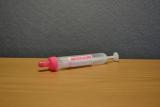KMT2A fusion gene assessment will be performed on all patients <70 years old diagnosed with AML or ALL based on immunophenotyping results via a reflex testing strategy. The KMT2A fusion gene assessment is performed as part of both AML and ALL panels. The AML panel also includes: CBFB-MYH11, RUNX1-RUNX1T1, PML-RARA, BCR-ABL1, FLT3 (ITD and D835), NPM1 gene mutation analysis. The ALL panel includes: ETV6-RUNX1, TCF3-PBX1 and BCR-ABL1 fusion gene analysis. The KMT2A gene, located on chromosome 11q23 is involved in multiple rearrangements in de-novo acute leukaemia and in rare cases of therapy related leukaemia. Approximately 10% of acute leukaemia harbour KMT2A rearrangements. Of these, two patient populations comprise the majority of cases: patients younger than 1 year of age at diagnosis (primarily ALL) and young to middle-aged adults (primarily AML). More than 120 different oncogene fusions involving KMT2A gene have been described in adult and paediatric acute leukaemia. A real time PCR KMT2A test designed to detect the following most common fusion transcripts is used: KMT2A-AFF1 t(4;11)(q21;q23), KMT2A-AFDN t(6;11)(q27;q23), KMT2A-MLLT3 t(9;11)(p23;q23), KMT2A-ELL t(11;19)(q23;p13.1) and KMT2A-MLLT1 t(11;19) (q23;p13.1). The assay will not detect other rearrangements. For clinical advice on appropriate investigations and advice for the interpretation of test results, please contact us. | 